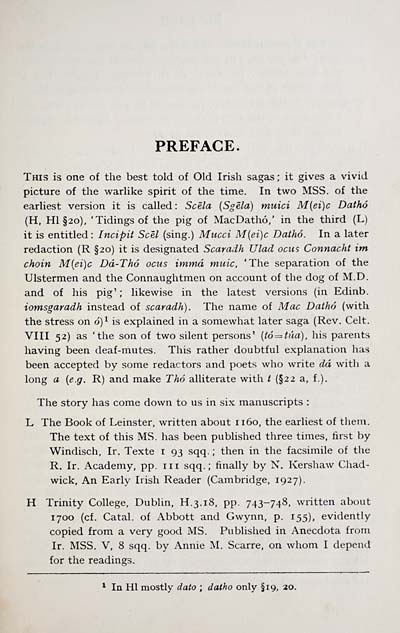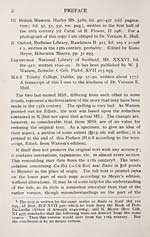Download files
Complete book:
Individual page:
Thumbnail gallery: Grid view | List view

PREFACE.
This is one of the best told of Old Irish sagas; it gives a vivid
picture of the warlike spirit of the time. In two MSS. of the
earliest version it is called : Scela {Sgela) muici M{ei)c Dathó
(H, HI §20), 'Tidings of the pig of MacDathó,' in the third (L)
it is entitled : Incipit Sell (sing.) Mucci M{ei)c Dathó. In a later
redaction (R §20) it is designated Scaradh Ulad ocus Connacht im
chain M{ei)c Dá-Thó ocus immá tnuic, 'The separation of the
Ulstermen and the Connaughtmen on account of the dog of M.D.
and of his pig' ; likewise in the latest versions (in Edinb.
iomsgaradh instead of scaradh). The name of Mac Dathó (with
the stress on 0)^ is explained in a somewhat later saga (Rev. Celt.
VIII 52) as 'the son of two silent persons' {tó=túa). his parents
having been deaf-mutes. This rather doubtful explanation has
been accepted by some redactors and poets who write da with a
long a [e.g. R) and make Thó alliterate with t (§22 a, f.).
The story has come down to us in six manuscripts :
L The Book of Leinster, written about 1160, the earliest of them.
The text of this MS. has been published three times, first by
Windisch, Ir. Texte i 93 sqq. ; then in the facsimile of the
R. Ir. Academy, pp. iii sqq.; finally by N. Kershaw Chad-
wick, An Early Irish Reader (Cambridge, 1927).
H Trinity College, Dublin, H.3.18, pp. 743-748, written about
1700 (cf. Catal. of Abbott and Gwynn, p. 155), evidently
copied from a very good MS. Published in Anecdota from
Ir. MSS. V, 8 sqq. by Annie M. Scarre, on whom I depend
for the readings.
^ In HI mostly data ; datho only §19, 20.
This is one of the best told of Old Irish sagas; it gives a vivid
picture of the warlike spirit of the time. In two MSS. of the
earliest version it is called : Scela {Sgela) muici M{ei)c Dathó
(H, HI §20), 'Tidings of the pig of MacDathó,' in the third (L)
it is entitled : Incipit Sell (sing.) Mucci M{ei)c Dathó. In a later
redaction (R §20) it is designated Scaradh Ulad ocus Connacht im
chain M{ei)c Dá-Thó ocus immá tnuic, 'The separation of the
Ulstermen and the Connaughtmen on account of the dog of M.D.
and of his pig' ; likewise in the latest versions (in Edinb.
iomsgaradh instead of scaradh). The name of Mac Dathó (with
the stress on 0)^ is explained in a somewhat later saga (Rev. Celt.
VIII 52) as 'the son of two silent persons' {tó=túa). his parents
having been deaf-mutes. This rather doubtful explanation has
been accepted by some redactors and poets who write da with a
long a [e.g. R) and make Thó alliterate with t (§22 a, f.).
The story has come down to us in six manuscripts :
L The Book of Leinster, written about 1160, the earliest of them.
The text of this MS. has been published three times, first by
Windisch, Ir. Texte i 93 sqq. ; then in the facsimile of the
R. Ir. Academy, pp. iii sqq.; finally by N. Kershaw Chad-
wick, An Early Irish Reader (Cambridge, 1927).
H Trinity College, Dublin, H.3.18, pp. 743-748, written about
1700 (cf. Catal. of Abbott and Gwynn, p. 155), evidently
copied from a very good MS. Published in Anecdota from
Ir. MSS. V, 8 sqq. by Annie M. Scarre, on whom I depend
for the readings.
^ In HI mostly data ; datho only §19, 20.
Set display mode to: Large image | Transcription
Images and transcriptions on this page, including medium image downloads, may be used under the Creative Commons Attribution 4.0 International Licence unless otherwise stated. ![]()
| Early Gaelic Book Collections > Matheson Collection > Scéla mucce meic dathó > (11) |
|---|
| Permanent URL | https://digital.nls.uk/81895270 |
|---|
| Description | Items from a collection of 170 volumes relating to Gaelic matters. Mainly philological works in the Celtic and some non-Celtic languages. Some books extensively annotated by Angus Matheson, the first Professor of Celtic at Glasgow University. |
|---|
| Description | Selected items from five 'Special and Named Printed Collections'. Includes books in Gaelic and other Celtic languages, works about the Gaels, their languages, literature, culture and history. |
|---|

